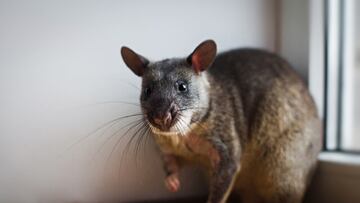Rat race: This is the reason why these pests are taking over cities and are so difficult to control
Rats are becoming more prominent in large cities across the world, with ways to keep them at bay often fruitless.


The word alone is enough to strike fear into many, and seeing one can cause nausea and fainting. Of course, if you’ve got musophobia — an irrational fear of rats — then this is no laughing matter, but for most, they just make us squeal.
It turns out that most cities across the world are now facing an alarming surge in rat populations — a phenomenon some are calling “Ratmageddon.” Across the UK, reports are multiplying of multiplying rodents creeping through back alleys, scaling walls and burrowing into homes. What once appeared to be isolated incidents now look like part of a much larger urban uprising.
The BBC cite a study which shows that “in Washington DC the increase was almost 400%, in San Francisco it was 300%, Toronto 180% and New York 160%."
Ratmageddon: Why rats are overrunning our cities - BBC News
— Mark Williamson (@markrwilliamson) September 26, 2025
Anything to do with food rubbish perhaps?
More than half a million rat infestations were reported to UK councils, between 2023 and the middle of this year.
Number of reported infestations are up in Cambridge 👇 pic.twitter.com/2rcYSGqcMc
In cities that already struggle with density and older infrastructure, the signs are stark. In some places, rodents are not just in sewers or alleys — they’re venturing into buildings, attics, and even second and third floors. Wherever there is clutter, food debris, or shelter, they are taking hold.
Authorities and pest controllers are scrambling to respond: some councils are increasing collection frequency, improving bin design, and targeting breeding hotspots with traps. But the scale of the problem makes this a tricky business. Even when isolated control measures succeed, re-invasion from nearby blocks can undo those gains in a short time.
Scientists warn that warmer climates are playing a significant role in the explosion of rat populations in cities. As winters become milder and springs arrive earlier, rats are able to stay active longer, venturing out of their burrows and breeding for extended periods. More foraging days means better access to food, which supports more breeding cycles and leads to faster population growth. The aforementioned study claimed that “cities experiencing greater temperature increases over time saw larger increases in rats.”
To finish, I’ll leave you with a small excerpt from Richard Dawkins’ fascinating book, The Ancestor’s Tale, of how rats might end up taking over planet Earth.
“A world without rodents would be a very different world. It is less likely to come to pass than a world dominated by rodents and free of people. If nuclear war destroys humanity and most of the rest of life, a good bet for survival in the short term, and for evolutionary ancestry in the long term, is rats. I have a post-Armageddon vision. We and all other large animals are gone. Rodents emerge as the ultimate post-human scavengers. They gnaw their way through New York, London and Tokyo, digesting spilled larders, ghost supermarkets and human corpses and turning them into new generations of rats and mice, whose racing populations explode out of the cities and into the countryside. When all the relics of human profligacy are eaten, populations crash again, and the rodents turn on each other, and on the cockroaches scavenging with them. In a period of intense competition, short generations perhaps with radioactivity enhanced mutation-rates boost rapid evolution. With human ships and planes gone, islands become islands again, with local populations isolated save for occasional lucky raftings: ideal conditions for evolutionary divergence. Within 5 million years, a whole range of new species replace the ones we know. Herds of giant grazing rats are stalked by sabre-toothed predatory rats.* Given enough time, will a species of intelligent, cultivated rats emerge? Will rodent historians and scientists eventually organise careful archaeological digs (gnaws?) through the strata of our long-compacted cities, and reconstruct the peculiar and temporarily tragic circumstances that gave ratkind its big break?”
Richard Dawkins, The Ancestor's Tale, 2004
Related stories
Get your game on! Whether you’re into NFL touchdowns, NBA buzzer-beaters, world-class soccer goals, or MLB home runs, our app has it all.
Dive into live coverage, expert insights, breaking news, exclusive videos, and more – plus, stay updated on the latest in current affairs and entertainment. Download now for all-access coverage, right at your fingertips – anytime, anywhere.


Complete your personal details to comment